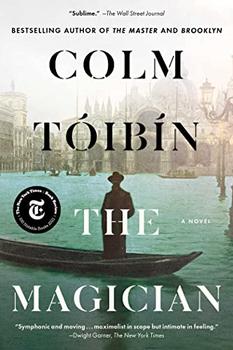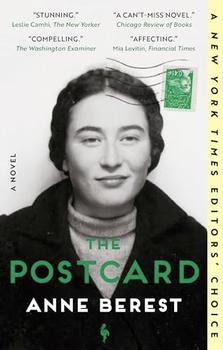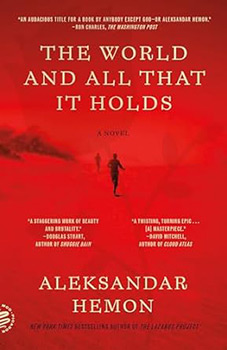Summary | Excerpt | Reading Guide | Reviews | Beyond the book | Read-Alikes | Genres & Themes | Author Bio

A Novel
by Colm ToibinThomas Mann — the subject of this biographical novel by Colm Tóibín — is regarded as a major 20th-century German writer, perhaps one of the best known of the so-called "Exilliteratur" writers — Germans in exile who opposed the Hitler regime. Author of works such as Buddenbrooks (1901), Death in Venice (1912) and The Magic Mountain (1924), Mann was awarded the Nobel Prize for Literature in 1929.
Against a historical backdrop which includes World War I, the rise of Hitler and Nazism, World War II, the Cold War and McCarthyism in the United States, Tóibín's novel examines the life of Thomas Mann from age 16 in 1891 to just before his death at age 80 in 1955. Although Mann lived through what can only be described as an eventful period in world history, the novel focuses on his personal and family life, his emotions and thoughts, and his art.
At 16, Mann was already writing poetry and developing a deep appreciation of music. Music and literature continued to be the essential threads in the fabric of his life; but, like a darker thread which is only suggested in the novel, there is his repressed homosexuality, which in later years found an outlet in his writing.
In 1897, Mann began to write Buddenbrooks – his first and perhaps his most loved novel. In describing the genesis of this work, Tóibín brilliantly sets out Mann's creative process, explaining how, as with all his novels, Mann drew deeply on the experiences of his own family. Consequently, Mann was criticized for writing a roman á clef – a novel which overlays historical fact with a façade of fiction. This is of course not unlike The Magician, where biographically and historically accurate events in Mann's life are given an added depth and breadth by the author's imagining of Mann's emotions and thoughts as the events unfold.
In 1933, while vacationing in France, Mann was told by his adult children in Munich that it would not be safe for him to return to Germany. Consequently, the family moved to Zürich. In 1939, as the Nazi stranglehold on Europe tightened, the Manns emigrated to the United States, living first in New Jersey where Mann taught at Princeton University, and then in Los Angeles. Tóibín demonstrates how Mann and Katia became prominent figures in the German expatriate community, with Mann recording speeches that were broadcast in Germany by the BBC. The essential theme of the speeches was the significant cultural difference between the German people and National Socialism.
The title of the book originates from an episode in which Mann's son Klaus was frightened by what he believed to be a monster in his room. Mann told Klaus he was a magician and would use his magic to send the monster away. The stratagem was successful and, from then on, his children called him the magician. But in Tóibín's novel, the word takes on a greater significance — Mann is a person who can wield magic with words, whether in his books, his letters or his speeches.
Tóibín has created magic in this book. In beautiful prose, he has brought Thomas Mann to life and given the reader an intimate look at a great author who lived with contradictions — his acclaim as one of the great 20th-century writers set against his hesitant and secretive inner life; his successful marriage to Katia and their six children set against his repressed homosexuality; and his love for Germany and its culture set against the Nazi ideology he detested.
In most of his novels, Tóibín explores the themes of living abroad, the creative process and the preservation of personal identity (and particularly of homosexual identity). In The Magician, these themes find expression in the struggles Thomas Mann experienced with each. It's a poignant portrayal and a pleasure to read.
![]() This review was originally published in The BookBrowse Review in October 2021, and has been updated for the
October 2022 edition.
Click here to go to this issue.
This review was originally published in The BookBrowse Review in October 2021, and has been updated for the
October 2022 edition.
Click here to go to this issue.

If you liked The Magician, try these:

by Anne Berest
Published 2024
Anne Berest's The Postcard is among the most acclaimed and beloved French novels of recent years. Luminous and gripping to the very last page, it is an enthralling investigation into family secrets, a poignant tale of mothers and daughters, and a vivid portrait of twentieth-century Parisian intellectual and artistic life.

The World and All That It Holds
by Aleksandar Hemon
Published 2024
The World and All That It Holds―in all its hilarious, heartbreaking, erotic, philosophical glory―showcases Aleksandar Hemon's celebrated talent at its pinnacle. It is a grand, tender, sweeping story that spans decades and continents. It cements Hemon as one of the boldest voices in fiction.






Your guide toexceptional books
BookBrowse seeks out and recommends the best in contemporary fiction and nonfiction—books that not only engage and entertain but also deepen our understanding of ourselves and the world around us.